The greenhouse isn’t a place most researchers linger. With condensation sticking to the glass windows, scientists usually don’t dawdle longer than 30 minutes in the heat and humidity. But Dangping Luo, on the other hand, doesn’t seem to mind and takes his time tending to his rice plants.
A research scientist in the Bing Yang lab at Bond Life Sciences Center, Luo, is a man of determination and conviction. For the past 18 years, Luo has been studying rice genetics and its interaction with disease.
“When I think something is of importance, I never give up,” Luo said.
Luo was working as a teacher in Southern China when he found his fascination for rice genetics. Luo went on to complete his Ph.D. at the South China Agricultural University in 2013. He then moved to Iowa with his family for his post-doctorate at Iowa State University, where he joined the Yang lab. Luo followed Yang to Bond LSC in 2018.
Although he was offered a professor position at a university in China, he turned it down in lieu of finishing his work at Bond LSC. The position is still open for him.
Part of that work continues to be published this year. Luo published a paper in January describing how the Xa7 resistance gene in rice protects the SWEET14 gene that is susceptible to a major disease for rice, bacterial blight.
“We hope that we can elucidate the mechanism and explain the resistance,” Luo said. “[This gene] may help us understand other genes better and can usually help us breed good rice.”
Luo found that Xa7 is an adaption in rice that has emerged to counteract efforts by blight bacteria pathogen infection.
“In the world, rice is very important, even in the U.S.,” Luo said. “Actually, almost half of the world’s population depends on rice.”
Luo’s 20 years of knowledge about rice comes in handy in the lab.
“I regularly ask him basic questions. I think he knows everything,” said Chenhao Li, visiting student in the Yang lab. “He’s really an expert on rice development and pathology, so it’s very nice because he has much more knowledge than me since I’m a student.”
Li met Luo three years ago at Iowa State University and has seen for himself Luo’s dedication.
“If you keep those plants healthy, they will give you great results,” Li said. “He just takes care of rice like it’s his baby. We usually take soil from the field, there are many impurities, but he would just totally clean the soil to prepare for the rice.”
Luo is proud that he’s been able to uncover many important rice genes and won’t stop until all his questions are answered.
“I really enjoy doing such work, even when it’s very hard,” Luo said.


